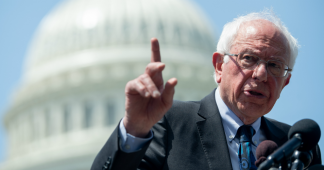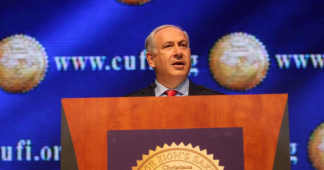Right-wing organisations have lauded Trump’s Israel-Palestine plan, while left and centre groups have universally panned it
By Richard Silverstein
3 February 2020
While US President Donald Trump’s “deal of the century” was almost universally reviled in political circles upon its unveiling last week, the response of US Jewish groups has been somewhat conflicted and muted.
Statements run the range from the usual suspects, right to left. AIPAC spoke favourably of the Trump administration’s efforts “to work in consultation with the leaders of the two major Israeli political parties to set forth ideas to resolve the conflict in a way that recognises our ally’s critical security needs”, and urged Palestinians “to rejoin Israelis at the negotiating table”.
It is characteristic of the Israel lobby to acknowledge how well the plan addresses Israel’s interests, while omitting any reference to Palestinian interests.
Curious responses
The Republican Jewish Coalition, largely comprising wealthy pro-Israel businessmen and Wall Street billionaires, had fulsome praise, calling it “a bold and nuanced proposal that is deeply rooted in America’s core values of liberty, opportunity and hope for the future”.
If you didn’t know better, you’d think the plan devised by Trump’s son-in-law, Jared Kushner, was a latter-day version of the Declaration of Independence and Magna Carta rolled into one.
Jewish members of Congress, most of whom are Democrats and closely allied with the Israel lobby, were curiously bloodless in their responses, offering mild praise. Eliot Engel, chair of the House Foreign Affairs Committee, said: “One of the expressions I always like to use is the devil is in the detail. We’ve seen the proposal. I haven’t looked at it extensively. There’s some good room for hope there.”
Ted Deutch, another senior Jewish lawmaker closely associated with the lobby, also offered positive remarks, saying the Trump deal “seems to preserve that possibility of a two-state solution … I believe and hope conversation can continue and lead to negotiations between the parties.”
Senate Democratic Leader Chuck Schumer curiously offered no views at all on the Trump plan in his remarks about it. He merely reiterated his own support for a two-state solution, without commenting on the substance of the deal. I’d call that a no-statement statement.
Answering to the Israel lobby
What’s odd about these reactions is that just as the Democrats have impeached the president, senior Jewish Democrats are speaking favourably about a peace plan that has been almost universally denounced by everyone, from Democratic presidential candidates to Israel’s leading liberal newspaper, Haaretz.
These politicians might not care what the US Jewish community thinks about the plan. A survey by J Street last year of likely Democratic primary voters found that Israeli Prime Minister Benjamin Netanyahu had a favourability rating of just 12 percent, while a separate poll by the American Jewish Committee of US Jews found that 59 percent disapproved of Trump’s handling of US-Israeli relations.
et, pro-Israel Democrats don’t answer to the average Jewish voter, but rather to the Israel lobby and its wealthy donors who bankroll their campaigns. There is no other logical explanation for any of them to express even modest support for such a misbegotten proposal from a disgraced Republican president.
The Union for Reform Judaism, meanwhile, released this milquetoast statement: “We laud all efforts to bring peace and firmly believe that a secure Israel side by side with a viable Palestinian state is in the best interest of American foreign policy and, of course, for the future of Israel as a Jewish and democratic state.”
t went on to express “concern” over Netanyahu’s vow to “establish, unilaterally, Israeli law over all of those West Bank settlements and the Jordan Valley proposed for final status under the Trump plan”, calling the move “dangerous for Israel’s future and for stability and peace of the region”.
Perpetuating the conflict
At the same time, a range of groups from centre to left have universally panned the deal. The liberal Zionist J Street, closely aligned with the Democratic Party, called it “the logical culmination of repeated bad-faith steps this administration has taken to validate the agenda of the Israeli right, prevent the achievement of a viable, negotiated two-state solution and ensure that Israel’s illegal occupation of Palestinian territory in the West Bank becomes permanent”.
It sought to use the rollout to its own advantage, as an organising tool to increase its own support. It even launched the Twitter hashtag #peacesham.
Jewish Voice for Peace, the largest progressive group in the country, was even more damning, calling it “an apartheid plan” and “a distraction ploy by two warmongers who are prioritising their personal election campaigns over any semblance of statecraft”.
Jewish presidential candidate Bernie Sanders appeared hesitant to mingle his response with his campaign, which is riding high in the upcoming Iowa caucus, with his Senate office releasing the following statement: “Any acceptable peace deal must be consistent with international law and multiple UN Security Council resolutions. It must end the Israeli occupation that began in 1967 and enable Palestinian self-determination in an independent, democratic, economically viable state of their own alongside a secure and democratic state of Israel. Trump’s so-called ‘peace deal’ doesn’t come close, and will only perpetuate the conflict.”
Compared to his thunderous denunciations of the “billionaire corporate elites”, this response is unusually buttoned-down for Sanders. It might reflect his belief that a truly progressive approach to Israel-Palestine won’t resonate with the electorate as much as a class-based economic analysis. But at least he’s offering more substance than Schumer.
The views expressed in this article belong to the author and do not necessarily reflect the editorial policy of Middle East Eye.
* Richard Silverstein writes the Tikun Olam blog, devoted to exposing the excesses of the Israeli national security state. His work has appeared in Haaretz, the Forward, the Seattle Times and the Los Angeles Times. He contributed to the essay collection devoted to the 2006 Lebanon war, A Time to Speak Out (Verso) and has another essay in the collection, Israel and Palestine: Alternate Perspectives on Statehood (Rowman & Littlefield) Photo of RS by: (Erika Schultz/Seattle Times)
Published at https://www.middleeasteye.net/opinion/deal-century-highlights-conflicting-priorities-us-jewish-groups











